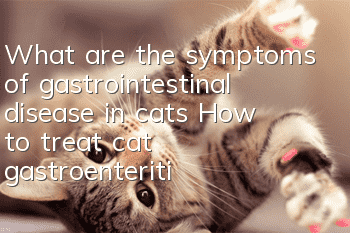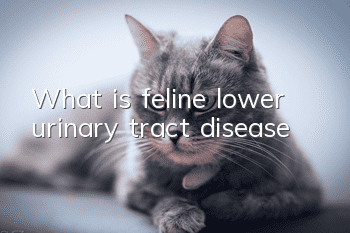What are the symptoms of gastrointestinal disease in cats? How to treat cat gastroenteritis!

For cats, gastrointestinal disease is a disease that cats are prone to in all seasons. However, because food spoils and deteriorates too quickly in hot weather, and parasites are more active, so if you are not careful, it will occur without the owner noticing. It may lay hidden dangers for cats’ gastrointestinal health, making cats more susceptible to gastrointestinal diseases in summer.
Classification of gastrointestinal diseases
Generally speaking, feline gastroenteritis refers to acute or chronic inflammation of the cat’s stomach, small intestine, colon mucosa, etc. Gastroenteritis is mainly divided into two types: enteritis-based and gastritis-based according to the affected area. According to the inflammation that may be induced, it is further divided into acute and chronic two types, which need to be distinguished by cat owners.
Gastroenteritis mainly due to gastritis: In the early stage of the disease, cats will show sleepiness and weakness, poor energy, high body temperature, body fever, decreased appetite, vomiting, abdominal pain and diarrhea, and increased water intake. After drinking it, you will spit it out again. In the later stages of the disease, the cat will vomit more frequently, and the vomited saliva will contain blood. If the cat's abdomen is touched, the cat will show strong resistance or howl.
Gastroenteritis, mainly enteritis: The main symptom is diarrhea, or on the contrary, difficulty in defecation, and the excrement contains pus and blood, and has a fishy smell. After some cats suffer from gastrointestinal diseases, they will often feel cold and have aversion to cold, and always like to stay in a warm place.
Treatment, care and care of sick cats
When cats suffer from gastrointestinal disease in the later stages, the main symptoms include inconvenience in walking, continuous increase in body temperature, foaming at the mouth, spasms, severe dehydration, and death from functional failure. Therefore, after a cat is found to have gastrointestinal disease, timely treatment, maintenance and care are very important.
Timely treatment:If the cat is found to be abnormal, the owner should take the sick cat or collected excrement and vomit samples to the veterinarian for diagnosis and treatment as soon as possible. Cats with mild illness are generally treated with medication. If the owner buys the medication himself, it is best to choose medication rich in high-quality probiotics, taurine, fructooligosaccharides, digestive enzymes, etc. that can effectively inhibit harmful bacteria. product.
Adjustment of diet and daily routine: For cats in the recovery period, if they eat too much, it is best to stop feeding them for a day and feed them an appropriate amount of easily digestible and palatable liquid food, and Make sure you have enough drinking water. Summer food is prone to spoilage, so cats’ food needs to be refrigerated, fed in appropriate amounts, and the remaining food must be disposed of in time.
When cats are sick,You may not be able to have a regular schedule. For example, if you are unable to defecate in a designated place, but instead defecate anywhere at home, the owner needs to clean these places in time, and it is best to disinfect these places, and at the same time, the cat Have enough patience and understanding, and don't blame or yell at them, causing them mental and emotional stress.
Daily care: After feeding according to the doctor's instructions, be sure to let the cat have a good rest and minimize unnecessary activities. The cat is at its weakest during illness. If the temperature is low, be sure to keep it warm. For protective work, it is usually enough to cover them with pure cotton clothing. If necessary, you can supplement cats with nutrient solution, glucose, etc. according to the instructions of the veterinarian to help them regain their strength.
Daily prevention
The main reason why cats suffer from gastrointestinal diseases is caused by overeating, or accidentally eating rotten, indigestible irritating substances or things containing harmful chemicals. If the deworming and immunization work is not done well or the care is improper, the infection will occur. Diseases and parasitic diseases may also cause gastrointestinal problems. Therefore, to prevent cats from suffering from gastrointestinal diseases, it is very important to take preventive measures in these aspects.
1. Do not feed your cat too much food at one time. You should regularly and ration it according to actual needs to prevent the cat from eating too much and causing indigestion. Do not feed the cat chicken bones, etc., which can easily scratch the cat's stomach.
2. When purchasing cat food, you must choose high-quality cat food to prevent various harmful substances contained in inferior cat food from causing damage to the cat’s gastrointestinal tract. Cat food must be stored scientifically and classified to avoid cross-fertilization after food spoilage. Infection, once spoiled food is found, clean it up immediately.
3. When feeding cats on weekdays, pay attention to their dietary taboos. Do not feed onions, peppers and other foods that cats cannot eat.
4. Deworm the cat regularly.
5. Certain items used daily in the home, such as pesticides, paints, flower fertilizers, etc., must be kept out of reach of cats.
- Is the cat okay after drinking some tea?
- Diet precautions for cat mothers during pregnancy and lactation
- How to tell if a kitten is healthy?
- Can cats eat cabbage?
- When should newborn kittens be vaccinated?
- Why does a cat keep drooling?
- Are there parasites in the cat’s bed?
- How to train a cat not to go to bed
- What causes cats to have oily tails?
- Rumor-busting: Are laser pointers a good pet toy? Improper use can harm cats and dogs.



